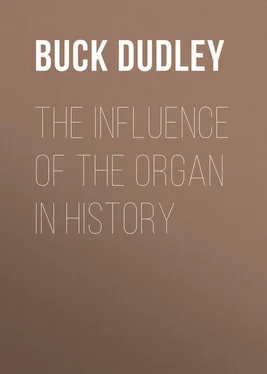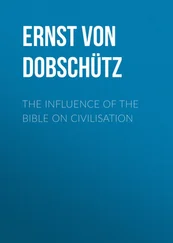Dudley Buck - The Influence of the Organ in History
Здесь есть возможность читать онлайн «Dudley Buck - The Influence of the Organ in History» — ознакомительный отрывок электронной книги совершенно бесплатно, а после прочтения отрывка купить полную версию. В некоторых случаях можно слушать аудио, скачать через торрент в формате fb2 и присутствует краткое содержание. Жанр: foreign_antique, foreign_prose, Историческая проза, на английском языке. Описание произведения, (предисловие) а так же отзывы посетителей доступны на портале библиотеки ЛибКат.
- Название:The Influence of the Organ in History
- Автор:
- Жанр:
- Год:неизвестен
- ISBN:нет данных
- Рейтинг книги:4 / 5. Голосов: 1
-
Избранное:Добавить в избранное
- Отзывы:
-
Ваша оценка:
- 80
- 1
- 2
- 3
- 4
- 5
The Influence of the Organ in History: краткое содержание, описание и аннотация
Предлагаем к чтению аннотацию, описание, краткое содержание или предисловие (зависит от того, что написал сам автор книги «The Influence of the Organ in History»). Если вы не нашли необходимую информацию о книге — напишите в комментариях, мы постараемся отыскать её.
The Influence of the Organ in History — читать онлайн ознакомительный отрывок
Ниже представлен текст книги, разбитый по страницам. Система сохранения места последней прочитанной страницы, позволяет с удобством читать онлайн бесплатно книгу «The Influence of the Organ in History», без необходимости каждый раз заново искать на чём Вы остановились. Поставьте закладку, и сможете в любой момент перейти на страницу, на которой закончили чтение.
Интервал:
Закладка:
Dudley Buck
The Influence of the Organ in History Inaugural Lecture of the Department of the Organ in the College of Music of Boston University
SECTION I
Ladies and Gentlemen: —
It having become my duty to deliver this, the inaugural lecture of the organ department attached to this institution, I have found myself considerably embarrassed as to choice of subjects.
The trouble lay in the quantity of material at hand, and not in any lack of it.
The history of the Organ runs back so far into the centuries, that no matter what point one might select for examination, it can scarcely be brought into the scope of a lecture except in a very empty and skeleton form. You will bear with me, then, for the superficial manner in which I shall be forced to treat many important points. As many of those present do not propose to make a study of the organ, I shall avoid treating of the instrument itself in any technical sense, and would offer a few thoughts on the subject of
with a glance at the "schools of playing" thus created.
The Organ is called the "king of instruments."
This phrase has been used so often that it has become decidedly well worn and trite. None the less, however, is the expression full of significance; and to what an extent (especially in a historical sense) is known to but comparatively few persons, among whom I fear far too few organists would be found.
To bring up some of these neglected facts; to examine them in their historical and theoretical bearing, as well as in practice; to thus create a greater love for and appreciation of the instrument on the part of its students, – to do this, I say, is, if I apprehend it aright, one of the principal objects which the Boston University has had in view in founding this department.
The organ, then, is called the "king of instruments."
If we look at the phrase a little closer, it will be perceived that the simile is a striking one. A king, in the so-called "good old times of yore," if he were a man of any force of character, generally possessed, along with the divine right theoretical, any quantity of the human power practical. The day of more or less ornamental constitutional figure-heads had not yet arrived.
In other words, the live kings of the past, of the feudal time, moulded to their own tastes and characters their age, their people, or only their court, according to the innate ability they might possess. In turn they were themselves affected, to a degree, by their surroundings, but to a far lesser extent than is the case at this day, the balance of influence remaining largely in their favour.
I will endeavour to show that among musical instruments this "kingship," as regards the organ, held good in a parallel way, – that by its own nature as to construction, by its very faults and weaknesses, by the mission it was called upon to fulfil, it did, in very fact, long reign supreme as king of instruments.
Absolute power, as represented by a monarch, became narrowed down, in the lapse of centuries, by external forces working out their own independence, thus checking and limiting this absolutism. Here, too, I will endeavour to draw a parallel, and show that as years rolled on, the influence of the organ upon music in the abstract diminished. The process became inverted, and music began to affect the organ, rather than the organ it. To this we owe the vast improvements in the construction of the instrument, the many additions of new qualities of tone, and numberless new inventions of value still going on in our day, with a rapidity difficult to keep pace with. To fairly appreciate this past or present relation of things, it becomes necessary to take a hasty and necessarily superficial glance backward at the origin of the organ, – its invention and development.
All writers attribute the origin of the organ to that simplest as well as most ancient of musical instruments, called by the Greeks the "pipes of Pan," – Pan, in the ancient mythology, being the god of the woods and groves. It consisted of a few hollow reeds of various lengths, securely bound together, and blown by the lips. We still occasionally see and hear this instrument in our streets, performed upon by those nomadic "sons of art," the organ-grinders. The performer being obliged to move his head continually from side to side, an unpleasant and fatiguing operation, soon led to an attempt to blow these tubes artificially. From this resulted the placing of the pipes upon a small wind-chest, and the addition of a primitive bellows, the whole being easily carried and operated by one performer. Of particular value in the establishment of this historical fact was the discovery, in Syria, among some ancient ruins, of a sculptured figure playing on such an instrument. Although much mutilated, all the more important parts were still intact. This interesting relic was brought to England about the year 1853.
It should be mentioned here, that the word "organ," not unfrequently found in the Bible, should not be supposed to refer to any such instrument as the name would suggest to our minds. Both with the Greeks and Romans the term translated "organ" simply meant an "instrument," – and that of any kind, but with usage apparently favouring its application to musical instruments.
Upon the application of the bellows to supply wind, instead of the human lungs, the fingers were used to stop the pipes, and thus prevent their sounding all at once, which it is evident they would have done, standing on a simple wind-chest, which was filled by the bellows. As the number of pipes was gradually increased, the difficulty of managing them by hand of course became greater and greater. This in time led to the invention of the pallet, or valve, to control the admission of wind to each pipe, and by the close of the eleventh century we find it chronicled that there existed at Magdeburg an organ with a key-board comprising sixteen keys. From this time the name of the instrument begins to correspond with our modern idea of the same; its invention was a realized fact, although but a germ of that development which has since raised organ-building to its artistic importance. It must be borne in mind that the pedal organ, with its keys for the feet, was a much later invention. Meantime, the first keys made use of measured from three to five inches and a half wide. Consequently, the title of the performer on this instrument, in the eleventh century, was not that of organ- player , but organ- beater , the keys being struck by the fist, which was protected by a heavy glove. There was, it must be remembered, but one rank of pipes, and these could seldom, if ever, have been in tune, from the fact that they had no means of regulating the wind pressure; while in organs of later date, and at the present day, an even wind is secured principally by weights placed upon the bellows, and the creation of a reservoir of compressed air. At this early time the wind supply was furnished by the common bellows as used by blacksmiths. Thus the supply and consequent pressure of the wind would necessarily be in direct proportion to the muscle or activity of the blowers.
While the various discoveries and improvements in organs of the twelfth and thirteenth centuries were slowly progressing, almost the only vocal music the world knew were the Gregorian tones, or plain song of the Early Church. Harmony was entirely unknown, and indeed remained so for many a long year in anything like our modern significance. It is not my purpose here to enter into even a partial examination of the parallel progress of melody and harmony at this age of the world. You have already heard it treated by an abler pen than mine; nor does it properly belong to this department, except in so far as it becomes necessary to note any decided influence exerted by the one upon the other.
Читать дальшеИнтервал:
Закладка:
Похожие книги на «The Influence of the Organ in History»
Представляем Вашему вниманию похожие книги на «The Influence of the Organ in History» списком для выбора. Мы отобрали схожую по названию и смыслу литературу в надежде предоставить читателям больше вариантов отыскать новые, интересные, ещё непрочитанные произведения.
Обсуждение, отзывы о книге «The Influence of the Organ in History» и просто собственные мнения читателей. Оставьте ваши комментарии, напишите, что Вы думаете о произведении, его смысле или главных героях. Укажите что конкретно понравилось, а что нет, и почему Вы так считаете.












